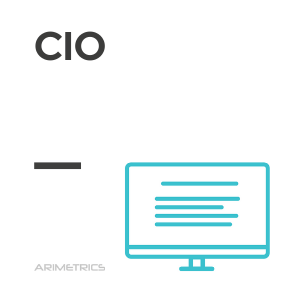
Definition:
The CIO (Chief Information Officer) or Chief Information Officer is an executive job title commonly given to the person in a company in charge of the information technology (IT) and computer systems necessary to support a company’s goals and its goals.
In many organizations, the CIO reports directly to the Chief Executive Officer (CEO) and sometimes sits on the company’s executive committee. Collaboration between the CIO and other executives, such as the Chief Marketing Officer (CMO), is becoming increasingly important as the integration of technology and digital marketing has become a key factor in business success. With the rise of information technology, the CIO position has gained prominence and is essential for any company seeking to maximize the use of technology as a competitive advantage.
Functions performed by a CIO
Among the main tasks of a CIO in his job we can highlight:
- Prospecting and recommendation of technologies to be used within the company: knowledge is one of the strong points of any CIO, who must be aware of all the new developments that are emerging in the field of information technology and how to apply it efficiently within the company.
- Create business value through technology: ROI is undoubtedly the cornerstone of companies as far as economic objectives are concerned, in this sense from the general management it is understood that investment in technology has to return in the form of economic benefit for the company so the CIO has to know how to make the most of all its economic resources.
- Ensure that the company’s technologies are aligned to achieve the general objectives:the implementation of IT by the CIO requires a perfect knowledge of the operation of the company so that they adapt to the maximum to the needs of the same.
- Personnel management of the IT department:as director of information technology, it is assumed that you have a team in your charge that you must organize and supervise.
- Supervise and approve the acquisition of technology by the company:ultimately, it will be the CIO who must decide whether or not to proceed with the purchase of our technologies by the company, giving the go-ahead to each new acquisition.
- Establish IT policies and standards:implement quality control processes and standards of conduct that involve the use of these technologies.
- Create and approve technology investment budgets:economic and financial skills are required, manage the budget and invest it in those projects that are most profitable for the company.
- Coordination with the rest of the departments:The CIO must be in constant communication with the rest of the departments of the company: Finance, Human Resources, Digital Marketing, Sales…
Requirements to be a CIO
The CIO role requires a strong technical background in the new technology sector, generally supported by a bachelor’s or master’s degree in computer engineering or a related field. In addition, candidates are expected to have at least five years of experience in an IT department. However, the CIO profile has evolved beyond technical skills. Today, managerial skills such as organizational ability, financial literacy and leadership are valued. These competencies are essential to effectively manage the IT department and contribute to the overall success of the company.
Challenges and opportunities for a CIO
The role of the CIO is full of challenges, but it also offers significant opportunities to influence the strategic direction of the company:
- Continuous innovation: The CIO must foster a culture of innovation within the IT department.
- Change management: Implementing new technologies often involves organizational changes that the CIO must manage.
- Information security: The CIO must ensure that security measures are robust to protect company data.
- Digital transformation: The CIO plays a crucial role in the digital transformation of the company.
